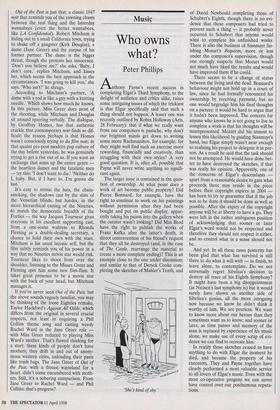Music
Who owns what?
Peter Phillips
Anthony Payne's recent success in completing Elgar's Third Symphony, to the delight of audience and critics alike, raises some intriguing issues of which the trickiest is that Elgar specifically said that such a thing should not happen. A lesser one was recently outlined by Robin Holloway (Arts, 28 February): that if what we really want from our composers is pastiche, why don't our brightest minds get down to writing some more Rachmaninov, for example, for they might well find such an exercise more rewarding, financially and creatively, than struggling with their own styles? A very good question. It is, after all, possible that Payne will never write anything so signifi- cant again.
The larger issue is contained in the ques- tion of ownership. At what point does a work of art become public property? Did Pierre Bonnard, for example, have the right to continue to work on his paintings without permission after they had been bought and put on public display, appar- ently taking his paints into the gallery when the curator wasn't looking? Did Max Brod have the right to publish the works of Franz Kafka after the latter's death, in direct contravention of his friend's request that they all be destroyed (and, in the case of The Castle, rearrange the material to create a more complete ending)? This is an example close to the one under discussion; and similar to that of Deryck Cooke com- pleting the sketches of Mahler's Tenth, and `She's kind of shy.' of David Newbould completing those of Schubert's Eighth, though there is no evi- dence that these composers had tried to prevent such a thing — it probably never occurred to Schubert that anyone would want to complete his unfinished works. There is also the business of Sussmayr fin- ishing Mozart's Requiem, more or less under the composer's supervision, though one strongly suspects that Mozart would not much have liked the results and would have improved them if he could.
There seems to be a change of status between the living and the dead. Bonnard's behaviour might not hold up in a court of law, since he had formally renounced his ownership by receiving payment, but no one would begrudge him his final thoughts on a picture: it would be hard to argue that it hadn't been improved. The concern for anyone who knows he is not going to live to complete a work is that his thoughts will be misrepresented. Mozart did his utmost to lessen this likelihood by guiding Siissmayr's hand, but Elgar simply wasn't near enough to realising his project to delegate it in per- son. As a result he said that the task should not be attempted. He would have done bet- ter to have destroyed the sketches, if that was really his opinion. Apparently, one of the concerns of Elgar's descendants apart from a reasonable desire to gain what proceeds there may reside in the piece before their copyright expires in 2004 has been to try to guarantee that if the job was to be done it should be done as well as possible. After the expiry of the copyright anyone will be at liberty to have a go. They were left in the rather ambiguous position of acknowledging that sooner or later Elgar's word would not be respected and therefore they should not respect it either, and so control what in a sense should not be.
And yet. In all these cases posterity has been glad that what has survived is still there to do what it will with — to finish, to leave alone, to contemplate. Do we not universally regret Sibelius's decision to destroy all trace of his Eighth Symphony? It might have been a big disappointment (as Nielsen's last symphony is) but it would surely have shown us another side of Sibelius's genius, all the more intriguing now because we know he didn't think it worthy of him. We are prurient. We want to know more about our heroes than they sometimes want us to know; and sooner or later, as time passes and memory of the man is replaced by experience of his music alone, we make use of every scrap of evi- dence we can find to recreate him.
In reality those sketches ceased to have anything to do with Elgar the moment he died, and became the property of his executors. They and Payne together have clearly performed a most valuable service to all lovers of Elgar's music. Even with the most co-operative progeny we can never have control over our posthumous reputa- tions.


































































 Previous page
Previous page